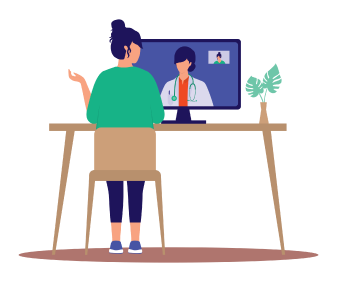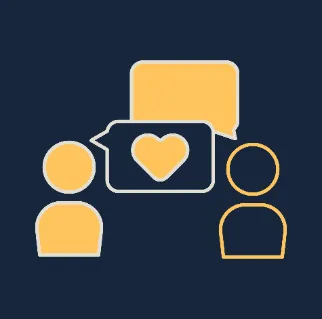
This disease awareness website has been developed and funded by Pfizer Ltd.
SEEKING HELP AND SUPPORT FOR YOUR MIGRAINE
We all need a helping hand or sympathetic ear from time to time so it's no surprise that building a support network that has your back can be important to help manage your migraine.
Symptoms can range from mild to severe pain, with nausea or sensitivity to light and sound1.
No one should have to face migraine alone.
- For urgent medical support visit NHS 111 online or call NHS 111
- You can also speak to your doctor or pharmacist for further information
What support is needed?
Support that people living with migraine may seek can include:
Seeking advice and support from your GP

Making an appointment to see your doctor5
We understand that making an appointment to see your doctor about your migraine can feel difficult.
Some people worry that the doctor will think their condition is not important or even that there is nothing their doctor can do to help.
But please know that your doctor will always want to support you. They understand that migraine is a medical condition and have a range of options available to help you.
Did you know?
Your doctor is required to engage with you in shared decision-making - a process bringing together the doctor's clinical expertise with your own preferences, goals, values and beliefs. Shared decision-making aims to support you in making health related decision that are right for you6,7.
Finding the right treatment for you will be a journey that you will go on with your doctor5.
Much is still unknown about migraine and why some people have success with some treatments and others don't8. It can be a process of trial and error, but you have people in your corner who are committed to finding the solution. An important step is making an appointment to talk to your doctor5.
Seeking help and support from others around you
Whether it's your employer, family, friends, or colleagues, you have no obligation to talk about your migraine with those around you, but the support and understanding they can provide may be limited unless you share your experiences9.

Conversations about your migraine
You may need very little help from your employer, but a small amount of support can be decisive in enabling you to work effectively with migraine10.
It can be difficult for people to understand another person’s migraine3.
However, by sharing your experience with loved ones, they may be able to help you avoid potential migraine triggers, create a plan if a migraine attack occurs, and understand your need for a flexible schedule11.
Seeking help and support online
Living with migraine can be isolating and approaching the topic with someone who might not fully understand the impact can be challenging11.

Many people with migraine find the support they need by joining one of the many online
communities and support groups to connect with other people living with migraine12.
Alternatively, you can look around your local community and search online to find a migraine support group in your area.
References:
1. NICE Clinical Knowledge Summaries. Migraine: What are the clinical features and diagnostic criteria for migraine? Last revised in September 2022. https://cks.nice.org.uk/topics/migraine/diagnosis/diagnosis/ [Last accessed August 2024].
2. The Migraine Trust. Healthcare support. https://migrainetrust.org/live-with-migraine/healthcare/. [Last accessed August 2024].
3. The Migraine Trust. Help someone with migraine. https://migrainetrust.org/help-someone/. [Last accessed August 2024].
4. The Migraine Trust. The Migraine Trust Helpline. https://migrainetrust.org/what-we-do/our-information-and-support-service/. [Last accessed August 2024].
5. The Migraine Trust. Visiting your GP. https://migrainetrust.org/live-with-migraine/healthcare/visiting-your-gp/. [Last accessed August 2024].
6. NHS England. Shared decision-making. https://www.england.nhs.uk/personalisedcare/shared-decision-making/ [Last accessed August 2024].
7. NICE. Clinical guideline [CG150]. Headaches in over 12s: diagnosis and management. Published September 2012.
8. NHS inform. Migraine. https://www.nhsinform.scot/illnesses-and-conditions/brain-nerves-and-spinal-cord/migraine. [Last accessed August 2024].
9. University and College Union. Disclosing a Disability. https://www.ucu.org.uk/media/5445/Disclosing-a-disability-UCU-guidance/pdf/Disclosing_a_disability.pdf. [Last accessed August 2024].
10. The Migraine Trust. Managing migraine at work. https://migrainetrust.org/live-with-migraine/reducingtheimpact/managing-migraine-at-work/. [Last accessed August 2024].
11. National Headache Foundation. Talking About Your Migraine Disease With Loved Ones and Friends. https://headaches.org/talking-about-your-migraine-disease-with-loved-ones-and-friends/. [Last accessed August 2024].
12. Headache Awareness Month. Migraine Support Groups: Join a Community. https://www.migraineheadacheawarenessmonth.org/migraine-support-group/. [Last accessed August 2024].
Links to external websites are provided as a resource to the viewer.
The linked websites are neither owned nor controlled by Pfizer Ltd. Pfizer accepts no responsibility for the content or services of the linked site/s.
The information provided on this site is intended for general information and education and is not intended to be a substitute for advice provided by a doctor or other qualified healthcare professional.
PP-NNT-GBR-0262. August 2024.


